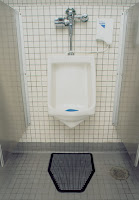 Roughly ten years ago, I walked into a public men's room and there was an old man in there standing in front of a urinal, with both arms raised and pressed against the wall, as if taking advantage of this downtime to take a brief upper-body nap.
Frightened, I quickly left the men's room and told the story to all my friends. We laughed at the weird old man and his old man ways.
A decade passed, and last Friday I walked into the empty men's room at work and stood before a urinal. It had been a tough week. And I was exhausted. Before I knew it, my hands were raising and I slowly leaned against the wall in front of me.
Quickly realizing what I had done, I lowered my hands and became instantly ashamed.
I have become that which I scoffed.
Roughly ten years ago, I walked into a public men's room and there was an old man in there standing in front of a urinal, with both arms raised and pressed against the wall, as if taking advantage of this downtime to take a brief upper-body nap.
Frightened, I quickly left the men's room and told the story to all my friends. We laughed at the weird old man and his old man ways.
A decade passed, and last Friday I walked into the empty men's room at work and stood before a urinal. It had been a tough week. And I was exhausted. Before I knew it, my hands were raising and I slowly leaned against the wall in front of me.
Quickly realizing what I had done, I lowered my hands and became instantly ashamed.
I have become that which I scoffed. December 3, 2007
Mocking My Future Self
 Roughly ten years ago, I walked into a public men's room and there was an old man in there standing in front of a urinal, with both arms raised and pressed against the wall, as if taking advantage of this downtime to take a brief upper-body nap.
Frightened, I quickly left the men's room and told the story to all my friends. We laughed at the weird old man and his old man ways.
A decade passed, and last Friday I walked into the empty men's room at work and stood before a urinal. It had been a tough week. And I was exhausted. Before I knew it, my hands were raising and I slowly leaned against the wall in front of me.
Quickly realizing what I had done, I lowered my hands and became instantly ashamed.
I have become that which I scoffed.
Roughly ten years ago, I walked into a public men's room and there was an old man in there standing in front of a urinal, with both arms raised and pressed against the wall, as if taking advantage of this downtime to take a brief upper-body nap.
Frightened, I quickly left the men's room and told the story to all my friends. We laughed at the weird old man and his old man ways.
A decade passed, and last Friday I walked into the empty men's room at work and stood before a urinal. It had been a tough week. And I was exhausted. Before I knew it, my hands were raising and I slowly leaned against the wall in front of me.
Quickly realizing what I had done, I lowered my hands and became instantly ashamed.
I have become that which I scoffed. November 30, 2007
Was it Worth it?
 Hypothetical: A man is walking down the street and sees a girl about to be hit by a car. He jumps in front of the car and pushes the girl out of the way. She lives. He dies.
Was the sacrifice worth it?
The problem is that we only get to see the consequences of the reality and not the alternative hypothetical. What will she do with her life compared to what he would have done? How will his death affect others compared to how hers would have?
So, what about Iraq? This logic clearly can not justify the reasons for our intervention. But, it does bring up a interesting thought regarding what we should do now, and pondering whether our sacrifice was worth it.
Saddam Hussein, a man who was ethnically cleansing his country through mass rape and murder is no longer able to do so. How many people would have been killed had we not intervened? Could it possibly be more than have died in this war? Would he have bartered his way into a nuclear weapon by now? Would he have used it?
Or, let's say we walk out now, claiming that we can not stay in a situation we entered due to faulty information. Muslims around the world call it a religious victory awarded by God. The appeal of Islamic fundamentalism grows. What would be the outcome of that?
Unfortunately, we won't really know whether or not any of this was worth it. Because, we'll only get to see the outcome of one side, whichever one happens.
Hypothetical: A man is walking down the street and sees a girl about to be hit by a car. He jumps in front of the car and pushes the girl out of the way. She lives. He dies.
Was the sacrifice worth it?
The problem is that we only get to see the consequences of the reality and not the alternative hypothetical. What will she do with her life compared to what he would have done? How will his death affect others compared to how hers would have?
So, what about Iraq? This logic clearly can not justify the reasons for our intervention. But, it does bring up a interesting thought regarding what we should do now, and pondering whether our sacrifice was worth it.
Saddam Hussein, a man who was ethnically cleansing his country through mass rape and murder is no longer able to do so. How many people would have been killed had we not intervened? Could it possibly be more than have died in this war? Would he have bartered his way into a nuclear weapon by now? Would he have used it?
Or, let's say we walk out now, claiming that we can not stay in a situation we entered due to faulty information. Muslims around the world call it a religious victory awarded by God. The appeal of Islamic fundamentalism grows. What would be the outcome of that?
Unfortunately, we won't really know whether or not any of this was worth it. Because, we'll only get to see the outcome of one side, whichever one happens. 
